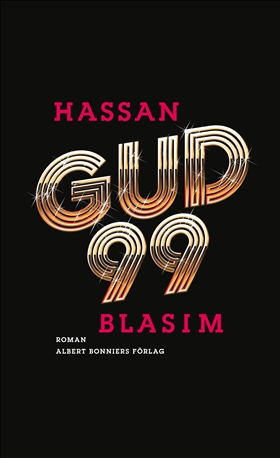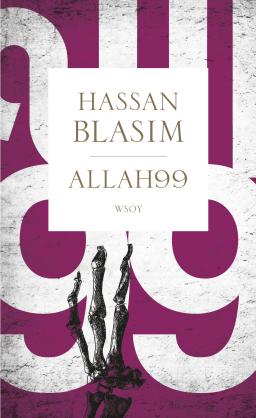
One of The Guardian’s Biggest books of autumn 2020.
Read an interview with Hassan Blasim about God 99 in The Guardian, part of their feature on ‘Europe’s most exciting authors’.
‘Blasim’s blunt rhetoric, macabre humour and blurring of reality and imagination can feel overwhelming, but the refugee experience is traumatic: language is bewildering, memories are clouded and truth is often distorted to save lives. Blasim perfectly captures that sense of alienation.’ – The Observer
Reading Hassan Blasim’s God 99 can be dizzying at times. This is a novel that blends literary forms and prose styles, juxtaposing passages about the horrors of war with a running commentary on Italo Calvino’s fiction. The sum total of that makes for one of the most singular reading experiences I’ve had lately; Blasim has found a fascinating space in which to operate.
As featured on the Words Without Borders: November Watchlist 2020.

Swedish critics
“Rarely have I read literature whose concern is so acute, where fiction feels so vital. […] The great thing about God 99 is that it is not only necessary fiction, but also comments on the necessity of fiction.”
”Sällan har jag tagit del av litteratur vars angelägenhet är så akut, där fiktionen känns så nödvändig. […] Det storslagna med ”Gud 99” är att den inte bara är en nödvändig fiktion, utan att den också kommenterar fiktionens nödvändighet.” – Dagens Nyheter
***
“In God 99 burlesque meets the serene in the form of lofty reflections on literature and philosophy. The result is a knock-out combination of poetry and hilarious anecdotes that cheerfully shows the finger to conventional western literature.”
”I ”Gud 99” möter burleskerier det serena i form av högstämda reflexioner kring litteratur och filosofi. Resultatet blir en knockande blandning av poesi och dråpliga anekdoter som glatt ger fingret åt all konventionell västlitteratur.” – Expressen
***
“Simply great literature. A crazy celebration of words unlike no other.”
”Det här är helt enkelt storartad litteratur. En vansinnig fest i ord utan dess like.” – Svenska Dagbladet

some critiques of Allah99 from Finnish media:
Antti Majander in Helsingin Sanomat 24 March
”Allah99 represents the best literature there is. Hassan Blasim writes masterfully and makes frontiers disappear between people.”
”A son of Baghdad finds is at home drinking booze in seedy East Helsinki.”
”The home country of the best literature is – literature. This is the case with Allah99.
You can actually stop reading this review. Just go ahead and devour Hassan Blasim’s book.
You will see how frontiers disappear between countries, cultures, egos and identities. It is like a miracle: as if any one of us could have a voice in the book – as one who has been kicked in the head, defiled, lost, missed, horny, beloved, exalted, together, alone.
Blasim’s characters are all individuals, but yet members of a global choir directed by a literary bandmaster with the boundless resources of a prestidigitator. He is playful, yet extremely serious.
Instead of a coherent intrigue, Allah99 hands the reader a kaleidoscope with ever-changing shapes.
When you think you have got the gist of the story, you will notice you are already reading a completely different fairytale, a sad, unbelievable and sometimes sweet fairytale taking place in Iraq in the past or right now, right on the demarcation lines of blunt global politics – or indeed in Helsinki suburbs, where the son of Bagdad feels right at home, plastered already in the afternoon.
This might sound complicated and therefore forbidding. However, this recent novel is fluid, a real page-turner. There is one sordid fate after another, but the narrative mosaic is so lively and rich that the reader’s experience is quite exhilarating. I cannot quite remember when was the last time I was on a ride quite like this.”
Henri Nerg in Savon Sanomat 22 March
“Even the most empathetic of art-lovers are often incapable of identifying themselves with novel characters who are victims of war, because the heavy and excessively serious language needed to express the horrors of war can create an alienating wall between the reader and the book. When you do not have first-hand experience of the cruelty of war, it can feel almost impossible even to try to get a deeper insight into a novel dealing with such issues.
Hassan Blasim’s literary works, however, are different. His unashamedly macabre sense of humour makes his reader, paradoxically, feel deep empathy towards his characters and identify with their absurd obsessions and fates. Blasim’s first novel is faithful to the style he adopted in his earlier collections of short stories.”
“Compared to Blasim’s earlier works, Allah99 is clearly more coherent and all-encompassing.
Blasim welds masterfully together the novel’s fragmented, chaotic form and its themes and general message. The texts has a hard time suppressing a feeling of fury that explodes in the reader’s face quite unexpectedly, thus creating a furious and rich world where you cannot but live as intensely as possible, because the next day you can be ripped to pieces in a suicide attack.
The characters’ fates underline a two-fold lack of a sense of belonging: both in their home countries and in the European way of life they have been forced to adapt to. Here Blasim is successful in dealing with a particularly hot topic from various points of view, without falling into the trap of over-simplifying the matter by instrumentalising the tragic fates of migrants in a sermon or a unidimensional message.
Islam, or the criticism against it, does not monopolise the text; religion is more like a curiosity if sorts, tragicomic and old-fashioned, and a delicious background for completely wacky tales.”
“The language of this novel is multidimensional and nuanced in its many intertextual references.”
“In many ways, Allah99 is a reckless, playful book that offers such savage flashes it makes the reader want to close his eyes – and, in the end, have a hearty laugh at them.”
Silvia Hosseini in Suomen Kuvalehti 22 March
“Although the stories often end tragically, as a whole Allah99 is a joyful read. Fireworks of imagination: polyphonic, rich, filthy and surprising. The didactic sentimentality that Finnish prose so often suffers from, is nowhere to be seen. Even when dealing with the most inconsolable of human fates, the book reminds that « there is a comical dimension in all phenomena with no exception ».”
“Another vivacious aspect in the novel is its corporality: there are loads of toilet and sex scenes. Some would accuse Blasim of having a strong male gaze, since his narrator drools after women so often. However, the horniness is so over-the-top that it actually becomes self-reflective irony. – – – But above all, sex belongs to this book because it is part and parcel of life. It is refreshing to read a book that so boldly refuses all modesty and moralism.”
“Hassan’s friend’s email messages give Allah99 welcome ambiguity. They serve as a loose framework for the novel’s stories. The friend is passionate about translating texts by Rumanian-born philosopher Emil Cioran as he ponders over the state of Iraqi contemporary literature: « How is it possible that all these cultural and other traumas and shocks that we have gone through still have not awakened our sleep-walking writers! ».
Writing is Blasim’s way to bring some sense to a chaotic world. Or if not sense, at least some solace, or sighs of relief.”
Matti Kuusela in Aamulehti 1 April
“One can only imagine how excited the publisher must have felt when Blasim handed them Allah99, just the right size, 328 pages: Would this be a perfect bestseller, a touching account of an artist fleeing the oppression in Saddam Hussein’s Iraq and finding new life, love and peace in Finland after enormous hardship? No way in hell! Blasim’s novel is anything but a commercial book written to please the crowds. Allah99 is impudent, reckless, sad, appalling, honest, forbidding, tear-inducing, emetic, thought-provoking, slimy, bloody, and, in the end, as clear and pure as Finnish Koskenkorva vodka. In fewer words: it’s the most important book in this millennium. For the first time, we can really feel, oh yes, feel, i.e. smell, hear and see what life is like in Iraq, a country raped by war.”
“You don’t want to read a text like this. Nonethelss, you feel compelled to go on, because you never know where Blasim takes you next.”
translated to English by Sampsa Peltonen